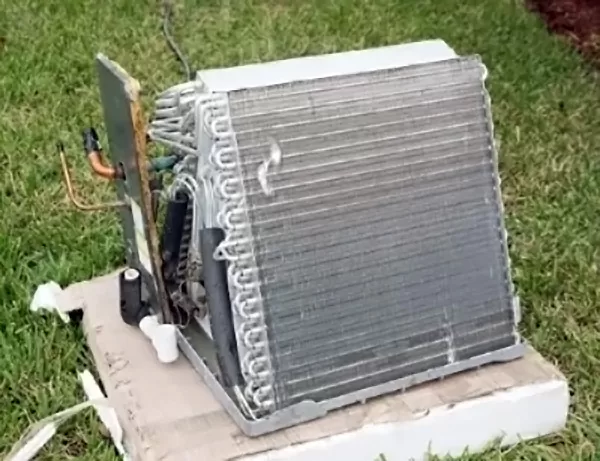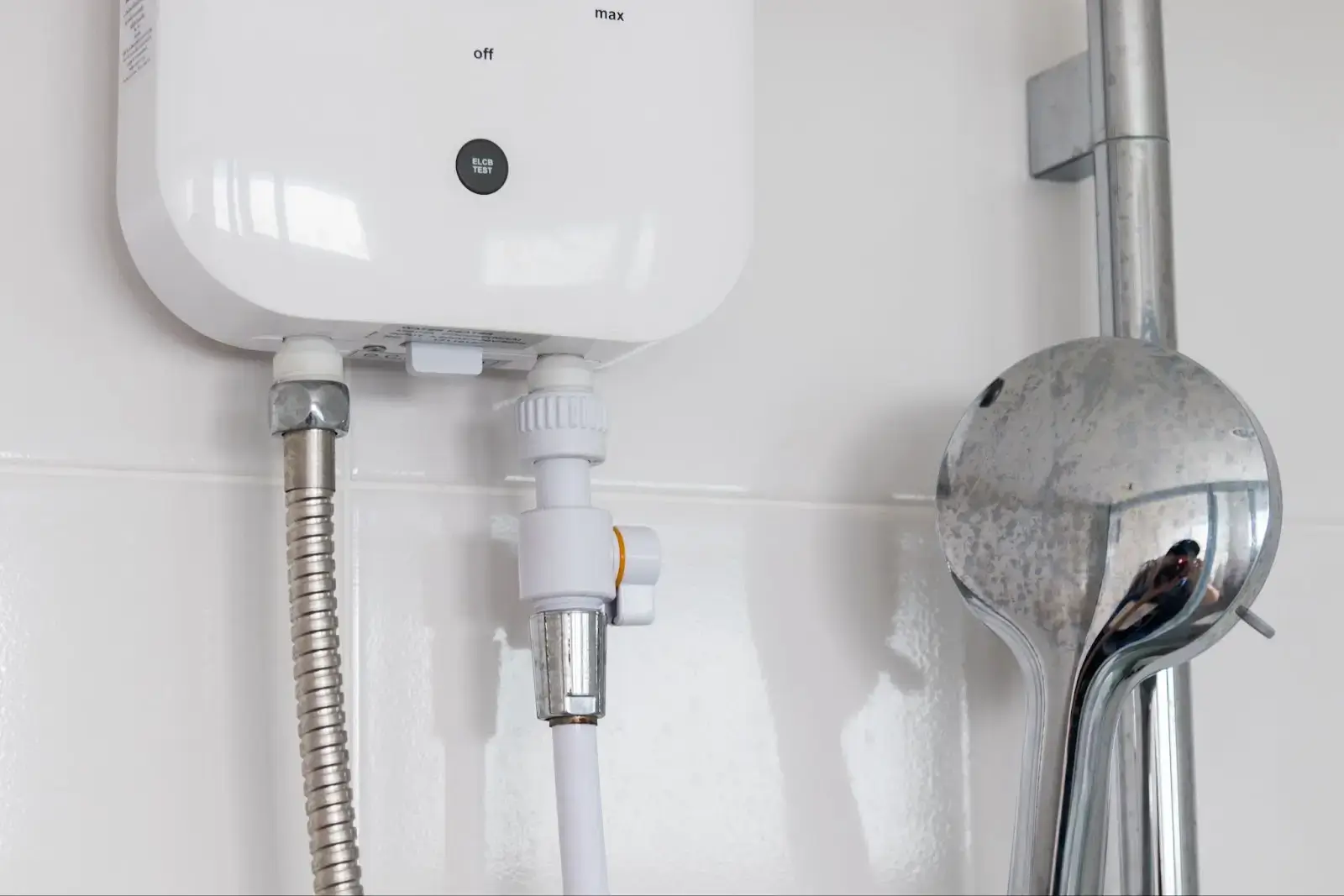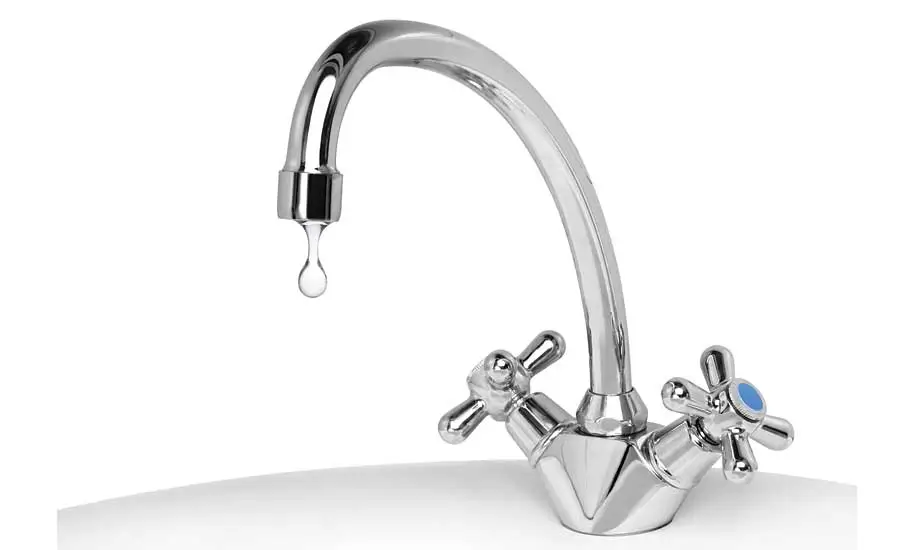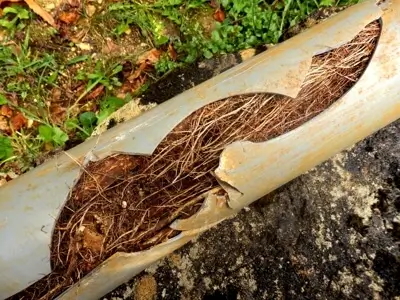Keeping your home's air conditioning system running smoothly is crucial for comfort and energy efficiency. One vital maintenance task that's often overlooked is cleaning the AC condenser coils. These essential components play a pivotal role in your AC's performance and longevity.
Today we’ll dive deep into the importance of keeping condenser coils clean, how frequently they require maintenance, and why neglecting this simple chore can seriously compromise your cooling capabilities.
Whether you're a hands-on DIYer or prefer leaving it to the pros, you'll walk away with a crystal-clear understanding of how to keep your AC condenser coils in tip-top shape.

AC Condenser Coil Basics
You know that big, boxy unit sitting outdoors? That's where the magic happens. Inside is a sprawling maze of tubing packed with refrigerant - the condenser coils. These unassuming components are ground zero for making your home's chill possible.
Here's how it all goes down: As hot air circulates in from inside, it passes over those refrigerant-filled coils. Think of them like a giant sponge, soaking up all that heat energy. Once saturated, a fan kicks on to wring them out, expelling the heat outdoors. It's like your house taking a deep breath in, then exhaling out the warmth.
This cycle of absorption and release is key to your AC delivering refreshing, crisp air on those sweltering days. But like any hard worker, those coils need some pampering too. Let too much gunk like dirt, leaves, and other outside grime accumulate on their fins and they'll start struggling.
Neglected coils are like wearing a parka to Palm Springs. They just can't do their job optimally when bundled up. Pretty soon you'll notice lukewarm air, spiking energy costs as the system strains, and maybe even premature breakdowns. Keep those coils squeaky clean though, and you're ensuring peak performance for efficient cooling all summer long.
Why Is Cleaning AC Condenser Coils Essential?
When summer temperatures start soaring, you'll want your air conditioning system operating at peak performance to keep your home comfortably cool. However, neglecting to clean the condenser coils can seriously undermine your AC's cooling abilities. Here are the major reasons why coil maintenance should be a priority:
Maximize Cooling Power
As condenser coils become coated with dirt, dust, pollen, and debris over time, their heat transfer capabilities diminish. All that built-up gunk acts as insulation, blocking the coils from effectively releasing captured heat outdoors. This forces your AC to work harder and run longer cycles to reach set temperatures, resulting in lukewarm air and uneven cooling.
Improve Energy Efficiency
When condenser coils can't shed heat properly, it puts extra strain on the entire system. Your AC must run hotter and work overtime to make up for the lack of heat dissipation. This excess energy consumption shows up as higher utility costs on your monthly bills. Proper coil cleaning restores efficiency.
Extend Equipment Lifespan
All that unnecessary stress from overworking takes a major toll on components like the compressor. Years of inadequate maintenance can lead to premature system breakdowns or complete failure before its expected lifetime. Regularly cleaning coils is an easy way to prevent costly repair needs.
Consistent Cooling Throughout
As condenser coil obstructions worsen, they create hot and cold spots throughout your home due to uneven heat distribution and airflow. Some rooms may be dramatically warmer than others. Thoroughly cleaning the coils resolves these imbalances.
Keeping your condenser coils well-maintained ensures your AC system can run at optimal cooling capacity with maximum efficiency and reliability when you need it most. It's one of the simplest yet most cost-effective practices for year-round home comfort.
How Often Should AC Condenser Coils Be Cleaned?
With the vital role condenser coils play in your air conditioning system's performance, the question is - how frequently should you have them cleaned? The answer can vary based on several factors, but there are some general guidelines to follow.
For most residential units, a thorough condenser coil cleaning once a year is recommended as part of annual pre-season AC maintenance. This yearly service helps remove the gradual buildup from the previous cooling season before the peak summer months hit.
However, there are situations where more frequent coil cleanings may be necessary every 6 months or so:
- If your home is in an area with high levels of airborne dust, pollen, pollution, or industrial contaminants that can rapidly coat the coils.
- For households with multiple pets that generate more dander, hair, and indoor allergens circulating outside.
- If the outdoor condenser is located next to a dusty dirt road or under trees/vegetation that spreads debris.
Even with ideal conditions, it's still a good idea to visually inspect your condenser coils monthly. If you notice any thick visible buildup forming, that's a sign they need cleaning to prevent efficiency issues.
Ultimately, the best frequency comes down to staying proactive based on your specific environmental factors. Neglecting coil maintenance for over a year allows ample time for performance-robbing gunk to accumulate. Proper cooling and energy savings depend on keeping coils as clean as possible.
What Are the Signs That Your AC Condenser Coils Need Cleaning?
While establishing a routine maintenance schedule is ideal, there are some telltale signs you shouldn't ignore that indicate it's time for a thorough condenser coil cleaning. Be on the lookout for these common red flags:
Reduced Cooling Efficiency
If you've noticed warm air blowing from your vents or some rooms not cooling evenly, it could mean obstructed condenser coils. Buildup acts as insulation, preventing proper heat transfer and limiting cooling power.
Higher Energy Bills
As condenser coils become more clogged over time, your AC has to work harder and run longer cycle times to achieve set temperatures. All that excess strain shows up as spikes in your monthly utility costs.
AC System Running Longer
If your AC never seems to cycle off, constantly running to try to cool your home, it's likely due to poor heat exhaustion from dirty coils forcing the unit into overdrive.
Overheating of the AC Unit
Similarly, you may notice the outdoor condenser unit itself getting abnormally hot to the touch during operation. This is a sign of airflow issues and blocked coils restricting heat release.
Visible Dirt and Debris
One of the most obvious signs is simply being able to see thick buildup coating the condenser coil fins when you inspect the outdoor unit. If it looks blanketed in gunk, it needs cleaning.
Unusual Noises
Increased heat and strain can cause components like the compressor and fan to make strange grinding or squeaking noises as they struggle with airflow obstructions.
Ice Formation
You may actually see ice developing on the coils, which occurs when airflow is blocked and causes condensation to freeze over the chilled coil surfaces lacking air circulation.
Foul Odors
As organic debris trapped in the coils starts to decompose and harbor bacterial growth over time, you may start to notice foul, musty odors coming from the AC system.
Reduced Air Flow
If you're experiencing weak or minimal airflow from vents with the AC running, it could mean debris buildup restricting proper circulation.
Frequent Repairs
Having to call for AC repairs on a yearly basis is an indicator of overall poor system health often stemming from inadequate coil cleaning and maintenance.
If you encounter a combination of these warning signs, it's time to show those coils some serious TLC. Acting quickly helps prevent further cooling deficiencies and potential equipment damage.
Can Dirty Condenser Coils Cause Damage to Your AC?
The short answer is - absolutely. Neglecting to keep your condenser coils clean can have disastrous consequences for your air conditioning system beyond just poor cooling performance. If left unaddressed, that stubborn gunk buildup poses a major threat of permanent damage.
When condenser coils become severely clogged, they force your AC to work exponentially harder to try compensating for the loss of heat transfer and airflow. This excessive strain creates a cyclical domino effect of issues:
Compressor Burnout
As the heart of the refrigerant system, the compressor has to run hotter and cycle more frequently when airflow is obstructed. This heightened workload and thermal load can cause premature compressor failure - one of the most expensive repairs.
Fan Motor Failure
The condenser fan responsible for exhausting heat also has to work overtime when battling low airflow conditions. This accelerates wear and tear on fan motor components.
Refrigerant Leaks
With the intense pressures placed on the sealed refrigerant lines and coils from sustained overheating, leaks can develop and cause refrigerant charge levels to drop drastically.
Frozen Coils
If airflow becomes fully restricted, condensation can freeze over the coil surfaces. This blocks heat absorption entirely and can lead to compressor failure from liquid refrigerant.
Electrical System Damage
As the AC strains from diminished heat exhaustion, it drives up energy consumption and risks overtaxing electrical circuits, potentially causing fire hazards.
The moral of the story? A simple coil cleaning is a small preventative investment compared to the exorbitant costs of replacing failed compressors, coils, fans, or an entire condensing unit itself. Proper cleaning prolongs longevity.
Rather than risk encountering these expensive nightmares down the road, partnering with an AC professional for routine coil maintenance just makes financial sense. A well-maintained system lasts for years.
How to Clean AC Condenser Coils: A Step-by-Step Guide
For the DIY-inclined, condenser coil cleaning is a maintenance task easily tackled with the right tools and technique. With proper precautions, you can help ensure peak cooling performance. Here's a step-by-step guide on how to safely and effectively clean your AC's condenser coils:
Preparation
- For safety, shut off power to the condensing unit by unplugging the disconnect box or shutting off the circuit breaker.
- Clear any vegetation, obstructions, or debris around the unit for unimpeded access to the coils.
- Gather your supplies: coil cleaning brush, coil cleaner solution, water hose, and dry cleaning cloths.
Brush Cleaning
- Use a coil cleaning brush (fabric or light wire) to gently brush off any surface buildup of dirt, leaves, and loose debris clinging to the coil fins.
- Work methodically from the top to bottom, brushing in the direction of the fins to avoid damaging or bending them.
Rinse
- Following the brushing, rinse the coils thoroughly with water from a normal garden hose. Spray perpendicularly to flush out debris from between the fins.
- For tougher grime, use a coil cleaner solution designed for HVAC units, spraying and letting it soak briefly before rinsing again.
Detail Cleaning
- For any remaining stuck-on grease or gunk, carefully use a small brush and the coil cleaner to lightly scrub between each fin row.
- Check the coils' drainage channels to dislodge any blockages so condensation can flow out properly.
Final Touches
- Once cleaned, towel off any excess moisture on the coil fins to prevent future buildup.
- Remove and wash/replace the reusable condenser air filter, if applicable.
- Straighten any coil fins bent during the process using a fin comb tool.
- Inspect all electrical components and wiring to ensure no moisture exposure.
- Reapply power to the unit and test run the system to ensure proper operation.
While an involved process, taking the time to meticulously clean the coils without damaging components provides tangible cooling benefits for your AC's performance.
Always exercise caution by verifying the unit is fully powered off and cooled down to avoid electrical shock or burns. Those uncomfortable working around electrical equipment should opt for a professional AC tune-up.
With proper cleaning tools and attention to detail, this chore keeps your system breathing easy for efficient, economical cooling all season long. Set a reminder on your calendar and make it an annual ritual!
Professional Maintenance vs. DIY: What's Best for Your AC Condenser Coils?
When it comes to cleaning your air conditioning condenser coils, you essentially have two routes - tackle it yourself as a DIY project, or bring in an experienced professional. Each approach has its own advantages and considerations to weigh.
The Case for DIY Coil Cleaning
With the right tools and some elbow grease, condenser coil cleaning can certainly be a DIY job for the handy homeowner comfortable working around HVAC equipment. The benefits of doing it yourself include:
- Cost Savings - Avoid paying labor fees every time the coils need cleaning.
- Convenience - Clean on your own schedule rather than making an appointment.
- Peace of Mind - See firsthand that the job is done thoroughly.
However, DIY does come with some risks if not approached properly. You must follow all safety protocols for powering down the unit and handling cleaning solutions. There's also the potential to damage delicate coil fins or system components if inexperienced.
When to Call in a Professional
For many homeowners, having an HVAC professional conduct annual condenser coil maintenance provides valuable peace of mind. The advantages of choosing the pro route include:
- Expertise - Technicians have specialized training to thoroughly clean coils without damage.
- Thoroughness - They'll inspect the entire system, not just coils, calibrating refrigerant levels.
- Warranty Coverage - Hiring a certified company preserves your equipment warranty coverage.
- Preventative Benefits - Techs can identify emerging issues before major breakdowns occur.
While more costly upfront, professional coil cleaning services are relatively inexpensive considering the investment you're protecting in your HVAC system.
The Right Approach for You
There's no definitive "best" method that works universally. DIYers able to carefully follow proper procedures can keep up with basic coil cleaning. However, for homeowners wanting to minimize hassle and risk while extending system life, professional maintenance is smart preventative care.
Many homeowners opt for a hybrid approach - taking care of light monthly coil brushing, while having the HVAC pros provide thorough annual cleanings and tune-ups before peak cooling season. This balanced approach combines personal oversight with expert servicing.
No matter which route you choose, keeping those condenser coils as clean as possible remains vital for cooling costs and system reliability. Establish a consistent maintenance plan that works for your household's needs.
Preventive Measures to Keep Your AC Condenser Coils Clean Longer
While regular condenser coil cleaning is essential, there are also some simple preventative steps you can take to help keep those coils cleaner for longer periods between maintenance. A little proactive approach goes a long way.
Install a Condenser Unit Cover
One of the simplest yet most effective preventative investments is purchasing an affordable, ventilated condenser cover designed to fit over your outdoor unit. These durable covers, made from breathable materials like vinyl or plastic-coated mesh, provide excellent protection against airborne contaminants getting pulled into the coils.
Things like leaves, grass clippings, cottonwood seeds, dust, and dirt are shielded from reaching the coils. Just be sure to remove the cover when operating the AC to allow for proper airflow. With this barrier in place, you can extend periods between deep coil cleanings.
Clear Surrounding Vegetation
Take a look at the area surrounding your condenser unit. Any overgrown bushes, shrubbery, trees, or vegetation in close proximity poses a debris risk that can rapidly coat the coil fins. Make a point to routinely trim back any plant matter encroaching within at least 2-3 feet of clearance around the unit.
This buffer zone reduces the amount of organic litter like fallen leaves, blooms, pollen, and sticky seeds from becoming airborne and blown directly into the coils. Keeping the area clear ensures nothing is disrupting smooth airflow either. A little conscientious landscaping goes a long way.
Use a Hosepipe or Air Hose Monthly
While annual or bi-annual deep cleanings are essential for condenser coils, you can also take a simple preventative step on a monthly basis to buy more time between those major maintenance sessions. Use an ordinary garden hose or air compressor hose to lightly spray off and dislodge any light, or loose buildup from the coil fins' surfaces before it has a chance to get impacted over time.
This prevents premature caking that can diminish heat transfer. Just be sure to use moderate pressure to avoid damaging the delicate coil fins. A quick monthly coil rinsing is an easy way to stay ahead of buildup.
Upgrade Filters Regularly
While HVAC air filters don't directly protect the outdoor condenser coils, routinely replacing them plays an important supporting role. As air circulates through your home, those filters catch dust, dander, hair, and other particulate matter before they can reenter the system.
When filters go unchanged for too long, they become clogged and ineffective - allowing unhealthy buildup to recirculate and find its way outside, accumulating on the condenser over time. Stay diligent about checking filter conditions every 1-3 months and swapping in fresh ones to enhance indoor air quality and reduce pollutants reaching the coils.
Schedule Seasonal Tune-Ups
Most HVAC professionals recommend an annual pre-season tune-up to ensure your entire cooling system is operating at peak condition for the grueling months ahead. As part of this comprehensive maintenance visit, technicians conduct thorough condenser coil cleaning and inspection using specialized tools and techniques.
They'll carefully straighten any bent fins, clear drainage channels, and identify any emerging issues before they escalate into costly breakdowns. Having the coils professionally deep cleaned at the start of the cooling season maximizes their heat transfer effectiveness and efficiency right out of the gate.
Check Sprinkler Locations
When situating lawn sprinklers or irrigation systems around your condensing unit's location, use caution in how you orient the sprayer heads. Any direct, concentrated spraying onto the coils themselves can quickly lead to mineral buildup and organic growth issues as dissolved solids accumulate over time.
This hardened gunk not only obstructs airflow but can corrode components. Double-check that none of your sprinkler zones are directly hitting the condenser, and make adjustments if needed. A little mindful positioning of spray patterns goes a long way in preventing this avoidable coil buildup.
These simple preventative habits, along with an annual deep cleaning, work in tandem to help maximize the time between full-scale condenser coil maintenance. A little conscientious care goes a long way toward cooling costs.
The Impact of Environmental Factors on AC Condenser Coil Maintenance
While all condenser coils require routine cleaning, the frequency can vary significantly based on your home's surrounding environmental conditions. Some situations create accelerated buildup that necessitates more vigilant maintenance.
Location Considerations
Properties in areas with high levels of airborne particulates like dust, pollen, smog, or industrial emissions will experience much faster accumulation on the coil fins compared to cleaner rural or suburban areas. The same applies to homes situated along busy dirt roads that create clouds of dust and debris.
Landscaping and Vegetation
If your outdoor condenser unit is located amid dense shrubbery, trees, or areas with seasonal seed dispersal, the constant bombardment of organic matter can quickly coat the coils. This includes regions prone to wildfires where ash residue is an issue.
Lawn Care Impacts
How you maintain your own landscape makes a difference too. Blowing grass clippings, over-mulching, or heavy leaf-laden areas during fall can send debris directly into the unit.
Seasonal Cycles
In many parts of the country, environmental factors follow a cyclical pattern that impacts cleaning needs. Plant blooms in spring, summer dust/smoke events, leaf-shedding in fall - anticipate more frequent maintenance during your area's messy periods.
Pets and Wildlife
Households with multiple pets that spend time outdoors tend to experience faster coil buildup from fur, dander, and paw debris getting circulated. Nesting birds or rodents seeking shelter among condensing units is also a contamination source.
While you can't control nature, understanding your local impacts allows you to adjust maintenance schedules accordingly. Homes in harsher environmental conditions simply require cleaning condenser coils on a more bi-annual or quarterly basis than conventional annual schedules. Stay ahead by planning for your conditions.
Keep Your Cool with Clean Condenser Coils
As the summer heat intensifies, your air conditioning system will be working overtime to keep your home an oasis of comfort. Don't let neglected condenser coil maintenance turn this seasonal relief into an expensive headache. Proper coil cleaning ensures your AC runs at peak efficiency, saving money on utilities while extending equipment lifespan.
When it comes to comprehensive cooling maintenance, Portland residents have trusted the experts at Sunset Heating & Cooling for 100 years. Their experienced HVAC technicians provide meticulous condenser coil cleanings as part of Sunset's thorough tune-up services. With an A+ rating from the Better Business Bureau, you can feel confident your system is in qualified hands using the latest techniques and approved cleaning solutions.
Don't let dirty coils compromise your home's cooling capabilities this summer. Call the friendly team at Sunset Heating & Cooling at (503) 500-5866 to schedule your AC tune-up and condenser coil cleaning today. Breathe easy knowing affordable comfort is just a call away!







